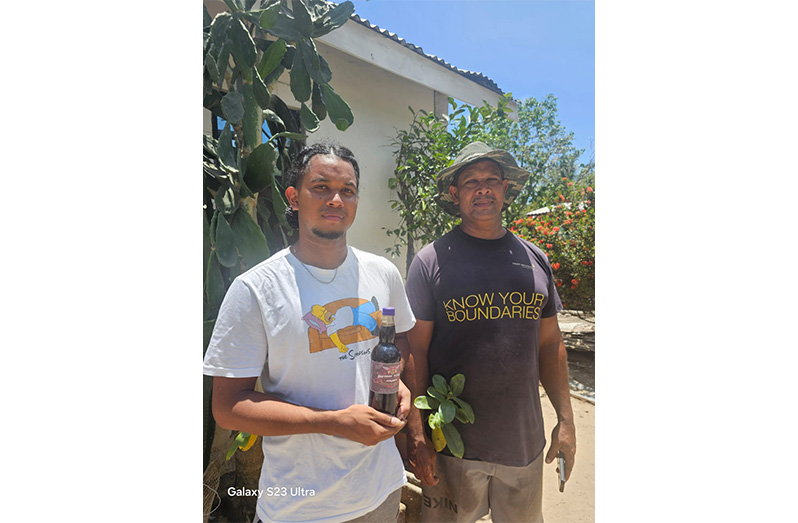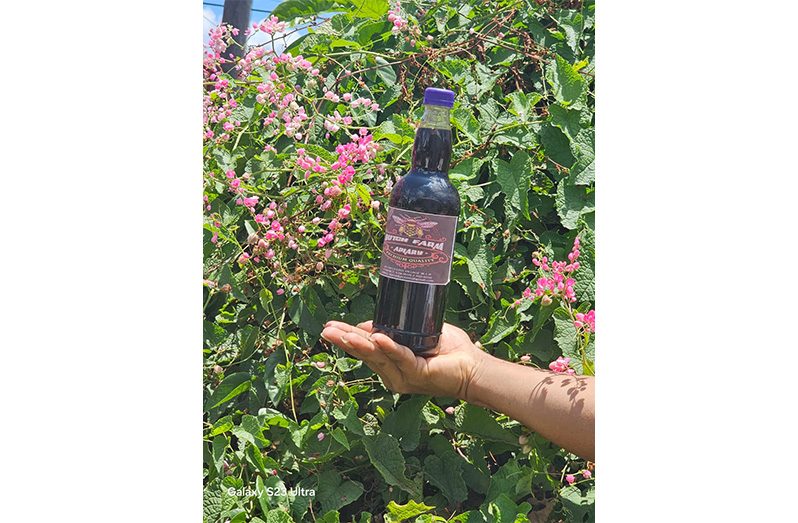– How Beekeeping is Transforming Lovely Lass
IN the soft glow of dawn, farmer David Dutchin tends to his hives with the quiet confidence of someone who has learned to move with nature rather than against it. Bees swirl around him, foraging freely among the mangroves that stretch along Guyana’s shoreline.
For Dutchin, each hive is part of a bigger story of how tiny workers are transforming Lovely Lass Village, West Coast Berbice, into a diverse, eco-friendly agricultural zone by integrating apiculture into its traditional livestock base.
Cradled by fertile backdam fields and the protective mangrove forests along Guyana’s shoreline, the small farming community of Lovely Lass has long been known for its cattle, goats, and small-scale crops.
The mangroves, once seen only as coastal protectors, now serve a dual purpose—providing rich forage for Dutchin’s bees while benefitting from the pollination that helps sustain and regenerate the forest.
A Farming Legacy Finds New Wings
Dutchin is no stranger to farming. A third-generation farmer, he grew up in a family where raising livestock and tending fields was a way of life.
“I learned that you have to love what you do, that way, it will lead you on the right path to success,” he reflected.
His own yard in Lovely Lass is a testament to that love, neatly divided to house pigs, black giant chickens, ducks, turkeys, pigeons, and even 14 dogs, all coexisting in relative peace.
Yet, for all his experience, bees were once the one thing outside his farming world. That changed the day he noticed a swarm clustering on a sucker tree in his garden.
With no protective gear and little knowledge, he carefully placed them in a box. Only later did he realise the danger he had faced with Africanised bees, creatures that can be deadly if mishandled.
That chance encounter marked the beginning of a new path, later nurtured by fellow beekeeper Lloyd Angus and strengthened by the Guyana Livestock Development Authority (GLDA), who provided boxes, training, and guidance.

Mangroves and Bees: A Natural Partnership
What makes Dutchin’s beekeeping venture unique is its connection to the mangrove forest. Along the coastline near Lovely Lass, bees forage among mangrove blossoms, producing honey that is distinct in both taste and texture—heavier, darker, and sweeter than honey harvested inland.
“I have some boxes at the backdam and some at the waterside among the mangroves. [The honey of] the bees placed at the waterside by the mangroves are different in taste, colour, sweeter and heavier in texture, while the backdam honey is sweeter and also completely different,” he explained.
But this relationship runs deeper than flavour. The bees pollinate mangrove flowers, helping sustain and regenerate the forest, while the mangroves provide forage and a relatively undisturbed, chemical-free environment for the bees.
For Dutchin, this is a living example of how ecology and agriculture sustain each other. The mangroves not only protect the coastline but also feed both the bees and the small ruminants that forage along their edges, creating a web of interdependence that strengthens livelihoods in Lovely Lass.
The Rhythm of the Honey Flow
Beekeeping in Guyana follows the rhythm of two honey flow seasons: from March to May and again from October to December. These are the times when flowering plants produce abundant nectar, allowing bees to gather and store honey in surplus.
“Poor flow season is caused by adverse weather patterns. If it is too dry the trees and plants will not produce flowers as they should, and if it is too rainy, it beats off the flowers,” Dutchin noted. “The weather has to be balanced for a good flow since bees forage and multiply before the rainy season.”
For Dutchin, responsible beekeeping means never taking more honey than the bees can afford to spare. “One box can give you one gallon of honey, but I always leave back the rest for the bees. That way they won’t become stressed and swarm,” he explained.
During the flow seasons, bee activity increases significantly, and Dutchin cautions residents to be careful when encountering hives in trees or buildings. Africanised bees, he reminded, can be aggressive if disturbed, and safety must come first.
A Family Affair and the Future of Apiculture
The Dutchin Farm Apiary is not a one-man effort. Davidson Dutchin, David’s 22-year-old son and a final-year student at the Guyana School of Agriculture (GSA), manages his own 35 hives—gifted through GLDA support—and is bringing new energy to the business.
Davidson is spearheading the development of an independent queen-rearing facility, a forward-looking innovation that will allow the family to expand their apiary sustainably while strengthening bee genetics in the region.
Together, father and son now manage nearly 100 hives between them. It is a partnership of tradition and innovation—David’s steady, experience-honed wisdom complemented by Davidson’s technical training and youthful drive.
Building a Brand of Trust and Quality
For Dutchin, success is not measured in gallons of honey alone but in the trust of his customers. Under the Dutchin Farm Honey brand, every bottle is labelled with its origin, allowing customers to trace it back to Lovely Lass.
“I believe in value for money. Once you do business, you give people quality—they will come for it and they will trust you. You must show them what true honey is from the fake ones on the market,” he said firmly.
Food safety is a priority, with hives kept in chemical-free environments to ensure the honey remains pure. For a growing number of health-conscious consumers turning to honey as a substitute for sugar, this authenticity is non-negotiable.
Honey Fest: A Platform for Growth
Beyond the farm, Dutchin is an enthusiastic participant in GLDA’s annual Honey Fest, a forum designed to showcase authentic honey, educate the public, and strengthen networks among beekeepers.
“Honey Fest is an excellent initiative. It gives us as beekeepers the opportunity to showcase our product, educate the public, and build networks of support. I am ecstatic about this year’s event,” he said, looking forward to Honey Fest 2025.
For Dutchin, the festival has been invaluable in boosting business exposure, creating opportunities for collaboration, and deepening solidarity within Guyana’s growing apiculture sector.





.jpg)








